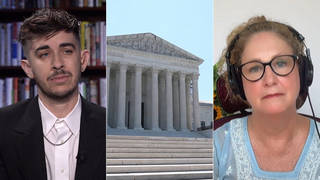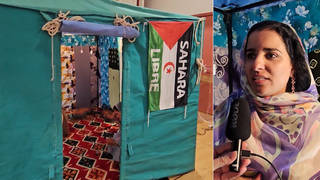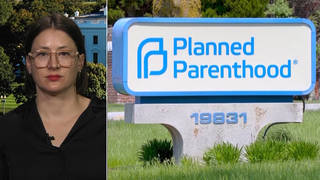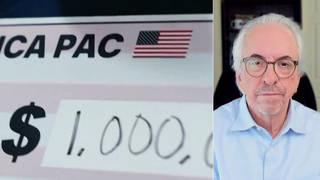
Topics
Guests
- Rob RichieExecutive Director of FairVote, part of the Center for Voting and Democracy.
- Sheila KrumholzExecutive Director of the Center for Responsive Politics.
As candidates make their last-minute push in New Hampshire in the first primary of the 2008 election, we take a look at the “front-loading” of the primary calendar with the New Hampshire and Iowa contests only five days apart and campaign financing — a staggering $400 million spent by the candidates so far. Where’s the money coming from? We speak with Rob Richie of FairVote and Sheila Krumholz of the Center for Responsive Politics. [includes rush transcript]
Transcript
AMY GOODMAN: New Hampshire goes to the polls today in the second vote of the primary season. On the Democratic side, Iowa victor Senator Barack Obama is holding a ten-point lead over Senator Hillary Rodham Clinton. Meanwhile, Republican Senator John McCain is holding a five-point lead over former Massachusetts Governor Mitt Romney.
Today’s vote caps the quadrennial barrage of political and media attention on Iowa and New Hampshire. Their place at the top of the primary calendar gives these two states enormous sway in deciding the eventual presidential nominees. The differences in candidates’ war chests are often a crucial factor in how these votes turn out. And money is aplenty this year. Democratic and Republican presidential hopefuls have already raised more than $420 million, and with that number expected to top $1 billion by campaign’s end.
We begin our election coverage today with two voices leading calls to reform this system. Rob Richie is Executive Director of FairVote. FairVote is campaigning for a drastic revision to the primary calendar. He’s co-author of the book Every Vote Equal. He joins me in Washington, D.C. And on the telephone, Sheila Krumholz, she’s Executive Director of the Center for Responsive Politics, a Washington group that follows campaign financing in US elections.
I want to start with Sheila Krumholz. Explain the amount of money we’re talking about this year, conservatively over $420 million. And how does it compare, well, to the last presidential election?
SHEILA KRUMHOLZ: Good morning, Amy. Well, we think that the money is quite a bit higher than that. We don’t have the final figures for the fourth quarter. But this compares to the last presidential election by about double. We think that this cycle will be about double. Last time it was $500 million; we think this time the nominees alone will need about half-a-billion each.
AMY GOODMAN: Each. Rob Richie, how does front-loading, the pushing up of the primary and caucuses, relate to the money?
ROB RICHIE: Well, it does in a couple ways. One is, there was so much intense focus on Iowa, it was incredible how much money was spent on this, you know, relatively small state with a relatively low turnout, but the stakes were obviously extremely high, as Hillary Clinton and Barack Obama are finding out right now. And so, they really felt they had to win Iowa, so they poured money in there.
But then they also, because of a very compressed schedule — you know, here we are seven months before the convention, ten months before the November election, and it’s almost all over. And some people say if Clinton loses today, then it’s sort of over for her. But on February 5th, there really is the final decisive set of primaries where about half the country is voting. And if you don’t have a whole lot of money by now, even if you did surprisingly well in Iowa and New Hampshire, it’s pretty tough to suddenly compete in the sort of airwave war that we’re going to see in just a few weeks.
AMY GOODMAN: This moving up of Iowa, New Hampshire and the other states, the amount of money we’re talking about, isn’t it at this point, the amount of money spent, something like three times what was spent so far this time in 2004?
SHEILA KRUMHOLZ: That sounds about right. I don’t have the exact figures. But we’re talking about a staggering amount this time, as compared to any previous cycle. And as Rob was saying, it’s the compressed primary season, the increased competition, of course, for this wide-open race, the first fully non-incumbent race in eighty years, the huge number of candidates in the field, and the cost — the increase in cost of television advertising and the increased contribution limits for individuals. You know, it’s pegged to inflation now, so it’s going to be bumping up each cycle. And at this time, an individual can give a candidate $4,600 for the full cycle. So there’s intense interest, there’s intense money so far.
AMY GOODMAN: Can you talk about television, Sheila Krumholz, how much TV is costing, how much the public airwaves are costing these candidates?
SHEILA KRUMHOLZ: Well, millions and millions. We were looking at the money spent in New Hampshire, and here’s the problem. The categorization, the information about the spending is so insufficient, because there is no — there is not enough information. They’re not required to give us exact information about how they’re spending the money, where they’re spending the money. So, for instance, we have Mitt Romney spending $3 million in New Hampshire. We have Barack Obama spending $1.3 million. Those figures are laughable, because, you know, that’s less than what any single candidate spent. Big-ticket items pass through vendors outside the state. So there really is — it’s anyone’s best guess what’s really being spent.
AMY GOODMAN: Rob Richie, can you compare, not back to 2004, which is also an astronomical sum of money —- let’s go back to the beginning of the modern primary system in ’68. What happened then? And compare the money then to now, forty years later.
ROB RICHIE: Well, I don’t have the stats on money, but I can certainly talk about the difference in the flow in ’68 and just sort of the very different political world we were in. That was the year that Lyndon Johnson was running for reelection, and he started off as the big favorite. But, of course, the Vietnam War was proceeding, and Eugene McCarthy shocked LBJ in New Hampshire, not by winning, but by running so close to him that he recognized that it was going to be a tough reelection bid, and he decided not to run. So, suddenly you had an open field, and other candidates started emerging, and Robert Kennedy could still jump in. And they went through a series of primaries that weren’t compressed. It went overtime. And, you know, the big vote in California, where Robert Kennedy was assassinated right afterwards, you know, that was a very extremely important vote way in June.
And we still had those kinds of extended important primary votes in ’76, when Jimmy Carter won and Jerry Brown could jump in the race and kind of make that interesting and actually win California late in the race; in 1984, when Walter Mondale, you know, lost a Gary Hart in New Hampshire, then they went through a series of primaries; 1988, where Jesse Jackson could win several primaries and, again, kind of a longer season, where the debate not just about who’s going to win or lose, but about the future of the party and about some really big decisions. And we’re having that conversation almost truncated just by the polls and by, you know, one-sixtieth of America voting in Iowa and New Hampshire. And -—
AMY GOODMAN: How is the order —-
ROB RICHIE: And then we’ll suddenly be down to the general election.
AMY GOODMAN: Rob Richie, how is the order deterimined?
ROB RICHIE: It’s -— well, Iowa and New Hampshire have this self-proclaimed right to be first. And New Hampshire, you know, says, “We’re first in the nation as a primary.” They must be frustrated that they let Iowa slip in as the first caucus, which was the way it started with Iowa not being defined as a primary. And the parties and the leading candidates tend to be a bit craven about challenging that role. So that’s that self-proclaimed right, and the parties essentially ratified that with party rules.
But then, going into this cycle, they said that there shouldn’t be any votes except for a handful — and we’ll see some Nevada and South Carolina voting in a few weeks — before February 5. But then they said it’s open season. So every state is saying, “Well, we don’t want to be out of this.” And so many states say, “Well, if we want to be relevant, we’ve got to move our primary up.” And that’s when so many big states and almost half the country, in the number of states, moved it up to February 5. And that was sort of a every-state-for-itself kind of free-for-all.
AMY GOODMAN: Sheila Krumholz, talk about the industries that are funding the candidates.
SHEILA KRUMHOLZ: You know, the sources of cash — the big story about the sources of cash are pretty consistent on both sides of the aisle and for all candidates, really. I mean, what the story is, it’s lawyers and law firms; it’s securities and investments, Wall Street; it’s retired people. And, of course, these are not your average pensioners. These are probably retired titans of industry that are still connected and giving campaign cash. Real estate is a huge source of money. That’s true for the Democrats, as well as the Republicans.
So what we then focus on is what’s standing out. For Ron Paul, it’s computers and internet. That’s a first. But when you’re talking about, for instance, Hillary Clinton and Barack Obama, it’s lawyers — for lawyers at $9.5 million for Clinton, securities and investments at Wall Street at $4.7; and then for Barack Obama, lawyers at $7.9, and retired as his second category, $4.9 million. So that is something that is consistent back in time. But again, there are a few standouts. Education has been bumping up. Education has given more to Barack Obama this time, $2.1 million by the third quarter, as compared to just $1.6 million for Hillary Clinton. TV, movies, music, Hollywood is about even for both of them, but a big source for Democratic campaign cash.
AMY GOODMAN: Well, Rob Richie, how do you fix the system?
ROB RICHIE: It’s eminently fixable. That’s one of the intriguing things. I mean, almost everything that’s really broken in our system, like the Electoral College and plurality elections and single-member districts, all these things — our voter registration system — really can be changed with political will and statutory changes.
This one actually really can be led by the parties themselves, and the Republicans may take the lead. They have a big meeting of their rules committee January 17th, and they are apparently starting a process, which they actually almost did in 2000, to revamp their schedule. The general approach that they like, and a version of it is what our group and some others recommend, is a graduated primary process where you do have states with small populations voting first, but then you have a break in time so you can kind of break this momentum and then have states, a relatively bigger number of states, but not that many more, voting and stretch it out more. And there’s ways to structure the schedule that it’s pretty likely that almost every state would in every election have a meaningful vote, and we’d have an ongoing conversation about the future of democracy within a party that I think we’re really going to miss out on this time.
AMY GOODMAN: And the whole story the Electoral College, what each of these primaries and caucuses mean, Rob?
ROB RICHIE: For the Electoral College or within the structure of the primaries?
AMY GOODMAN: How the system works. When a candidate wins a state, what does it mean?
ROB RICHIE: Oh, it’s an interesting fact. You know, one of our beliefs is that we should follow most of the rest of the world that has been holding elections in highly democratic countries and use proportional representation. And, actually, that’s what the Democrats require of primaries and caucuses. So any candidate that gets at least 15% of the vote wins that share of delegates, so that a convention is a reflection of candidates’ backers who at least got over 15%. The Republicans do that in a mix. And, actually, what makes it very volatile for Republicans is they’re about to enter a season where a lot of their primaries and caucuses are winner-take-all, and whoever finishes first, no matter how low the percentage, will win all that state’s delegates. So if they go into February 5th with a fractured field and Giuliani can win states and Huckabee can win states and Romney and McCain — they kind of win different state, they could really just have a weird sort of set of results. So proportional representation is part of the process.
In Iowa, the Democrats had a dynamic where they had instant runoff voting for the people who backed someone who wasn’t viable at a caucus, who didn’t have 15%. Those backers of those candidates could move to their second choice, just like an instant runoff election, which we recommend for general elections and ones where we want to accommodate choice and third parties and independents. The problem was, by the way, a lot of people have only focused on the delegate results on the Democratic side, not the straw poll vote, the kind of the first vote, so that people who voted for Kucinich or Biden or Richardson or weren’t, you know, in the viable standard, we actually never know what their votes were. So they look like they did a lot worse than they did. So kind of the instant runoff reality would have been better if they had allowed those votes to be tallied and reported and then still let those people go to their second choice and then get the final delegate count, with more people being able to chance to help elect a delegate.
AMY GOODMAN: And in the overall general election, how the Electoral College works and the whole push to have it abolished?
ROB RICHIE: Yeah. Well, it’s fascinating. One quiet story from last week is the State of New Jersey passed the National Popular Vote plan and sent it to Jon Corzine, who’s likely to sign it, to make the second state to enter this interstate agreement. And that’s the way, we think, can change the Electoral College, but we’re not going to have that in place this year.
This year, every state votes for president, or every voter votes for president, but they actually don’t vote directly for the person, they’re voting for a set of electors in each state that will then turn around and, you hope, vote for the person. And whoever wins a state gets all of those states electors in almost every state. And so, any state that’s not seen as competitive, as balanced enough that campaign activity might change the result, is completely ignored — not just somewhat ignored, just absolutely ignored. And then the big states like Florida and Ohio, that are close and big, get almost all the attention. It’s just incredible distortions of campaigning. So we’re about to enter a season where, you know, most of the country, including most of the big states and big cities and most of the small states and most states overall, are just going to be completely ignored by the candidates.
And a national popular vote would have every vote equal. That’s what the name of this recent book, Every Vote Equal, and it is something that — a lot of people thought we needed to change the Constitution to establish a national popular vote, but it turns out that states have the power to do it themselves. It’s like Dorothy in Kansas being able to get home by clicking her shoes. They determine how to allocate electoral votes, and they have the power to enter into interstate agreements with one another. So the idea of New Jersey and Maryland, which is the other state that has passed this, is they will give all of their electoral votes to the slate of the candidate who wins the national popular vote and do it once the number of participating states can guarantee election of the president.
And that plan is moving forward in a number of states. It’s actually been introduced in almost every single state. I think it’s going to pass in several more this year. We’ll see another lousy presidential election, in the sense of political equality being completely thrown out the window, and I think we’ll have it in place by 2012. So one bright light about reform opportunities is we can actually change the way we elect for president by state action, and then also the parties can change this presidential primary process. So we may have a whole different kind of presidential election in 2012.
AMY GOODMAN: Rob Richie, I want to thank you very much for being with us, Executive Director of FairVote, co-author of Every Vote Equal; and Sheila Krumholz, Executive Director of the Center for Responsive Politics, that’s a Washington watchdog that follows campaign financing in US elections. You can go to opensecrets to see how much the candidates have raised and from whom they have raised it.













Media Options